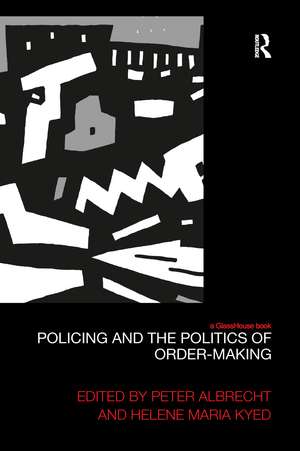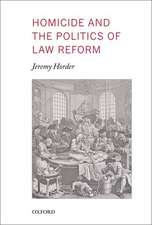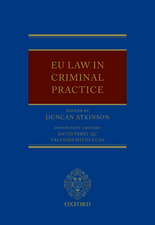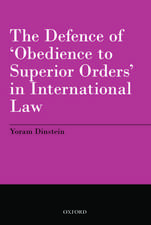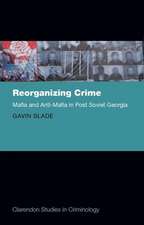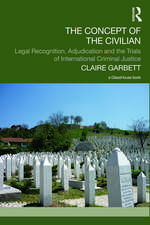Policing and the Politics of Order-Making: Law, Development and Globalization
Editat de Peter Albrecht, Helene Maria Kyeden Limba Engleză Paperback – 12 iul 2016
| Toate formatele și edițiile | Preț | Express |
|---|---|---|
| Paperback (1) | 469.34 lei 6-8 săpt. | |
| Taylor & Francis – 12 iul 2016 | 469.34 lei 6-8 săpt. | |
| Hardback (1) | 1054.71 lei 6-8 săpt. | |
| Taylor & Francis – 12 noi 2014 | 1054.71 lei 6-8 săpt. |
Din seria Law, Development and Globalization
-
 Preț: 419.11 lei
Preț: 419.11 lei -
 Preț: 197.85 lei
Preț: 197.85 lei -
 Preț: 416.22 lei
Preț: 416.22 lei -
 Preț: 414.32 lei
Preț: 414.32 lei -
 Preț: 483.12 lei
Preț: 483.12 lei - 18%
 Preț: 1286.61 lei
Preț: 1286.61 lei -
 Preț: 414.39 lei
Preț: 414.39 lei -
 Preț: 388.13 lei
Preț: 388.13 lei -
 Preț: 443.65 lei
Preț: 443.65 lei -
 Preț: 409.69 lei
Preț: 409.69 lei -
 Preț: 449.41 lei
Preț: 449.41 lei -
 Preț: 469.76 lei
Preț: 469.76 lei -
 Preț: 469.34 lei
Preț: 469.34 lei - 18%
 Preț: 1002.18 lei
Preț: 1002.18 lei - 15%
 Preț: 487.33 lei
Preț: 487.33 lei -
 Preț: 412.41 lei
Preț: 412.41 lei -
 Preț: 363.96 lei
Preț: 363.96 lei -
 Preț: 413.76 lei
Preț: 413.76 lei -
 Preț: 487.37 lei
Preț: 487.37 lei - 14%
 Preț: 303.01 lei
Preț: 303.01 lei -
 Preț: 367.66 lei
Preț: 367.66 lei - 9%
 Preț: 934.96 lei
Preț: 934.96 lei - 18%
 Preț: 1003.99 lei
Preț: 1003.99 lei -
 Preț: 388.90 lei
Preț: 388.90 lei - 15%
 Preț: 491.07 lei
Preț: 491.07 lei -
 Preț: 467.06 lei
Preț: 467.06 lei
Preț: 469.34 lei
Nou
Puncte Express: 704
Preț estimativ în valută:
89.82€ • 93.43$ • 74.15£
89.82€ • 93.43$ • 74.15£
Carte tipărită la comandă
Livrare economică 14-28 aprilie
Preluare comenzi: 021 569.72.76
Specificații
ISBN-13: 9781138211223
ISBN-10: 1138211222
Pagini: 218
Dimensiuni: 156 x 234 mm
Greutate: 0.45 kg
Ediția:1
Editura: Taylor & Francis
Colecția Routledge
Seria Law, Development and Globalization
Locul publicării:Oxford, United Kingdom
ISBN-10: 1138211222
Pagini: 218
Dimensiuni: 156 x 234 mm
Greutate: 0.45 kg
Ediția:1
Editura: Taylor & Francis
Colecția Routledge
Seria Law, Development and Globalization
Locul publicării:Oxford, United Kingdom
Public țintă
Postgraduate and UndergraduateCuprins
1. Policing and the politics of order-making on the urban margins, Helene Maria Kyed and Peter Albrecht 2. Policing Bagong Silang: Intimacy and politics in the Philippines, Steffen Jensen and Karl Hapal 3. Policing and the politics of protection on Lombok, Indonesia, Kari Telle 4. Rival Forms of Policing and Politics in Urban Swaziland, Helene Maria Kyed 5. Community policing in Accra: the complexities of local notions of (in)security and (in)justice, Emmanuel Addo Sowatey and Raymond Atuguba 6. New Authorities: Relating State and Non-state Security Auspices in South African Improvement Districts, Julie Berg with Clifford Shearing 7. Security Assemblages at the Urban Margins of Mexico City, Markus-Michael Müller 8. Closure of Bars, Cantinas and Brothels. Practices of civil in/security, state formation and citizenship in urban Bolivia, Helene Risør 9. Security Governance in Hout Bay: A study of three local communities’ capacity to engage in policing, Øyvind Samnøy Tefre 10. Young but not Alone: Youth Organizations and the Local Politics of Security Provision, Louis-Alexandre Berg 11. Secret Societies and Order-making in Freetown, Nathaniel King and Peter Albrecht
Recenzii
'Policing and the Politics of Order-Making is a smart and engaging examination of urban insecurity and policing, across a broad range of geographical locations. Scholars from a variety of disciplines will be interested in these essays’ explorations of order – what it means, how it is made, by whom, and the ways in which it is contested by a range of social actors. A much-needed contribution to our understanding of order-making in contemporary cities around the world.'
Daniel M. Goldstein, Professor of Anthropology, Rutgers University
‘This volume interrogates the policing of the world’s megacities. Combining innovative theory and empirically rich case studies, it explains how urban protection across the Americas, Africa and Asia comprises plural, overlapping policing actors of both state and citizens. The collection investigates the ways that people on the urban margins improvise their own protection amidst high crime rates, and how community policing emerges not simply as a reflex of neoliberal reforms but with its own history and politics. The case studies shed new light on youth-led civilian policing groups, how they operate in the ‘twilight’ between official sanction and covert racket, and how they are shaped by and produce their own political trajectories. This volume further complicates our understandings of global policing in a neoliberal age and is highly recommended.’
David Pratten, Oxford University
‘This is a timely and very welcome contribution to the ongoing exploration of the politics and practices of plural policing in the urban margins. The well written chapters convincingly show how hard-to-categorize policing actors in cities such as Manila, Cape Town, Accra, Port-o-Prince and Mexico City, engage in everyday order-making as well as overt politics, ambiguously manoeuvring the fine lines between legitimate and illegitimate use of violence.’
Finn Stepputat, Danish Institute of International Studies
"It might be imagined that... challenges to the state's claim on the monopoly of security provision, ordermaking and the legitimate use of violence leads to constant conflict between the local groups and the authorities. However, the cases presented in Policing and the Politics of Order-Making demonstrate that the norm is a degree of liaison, if not co-operation, with the state police. Certainly, the very popularity and success of these groups evoke from the formal providers both resentment of their rivals and jealousy of the symbolic capital (prestige and attention) that they possess."
Bruce Baker for The RUSI Journal (2015)
'Policing and the Politics of Order-Making is a smart and engaging examination of urban insecurity and policing, across a broad range of geographical locations. Scholars from a variety of disciplines will be interested in these essays’ explorations of order – what it means, how it is made, by whom, and the ways in which it is contested by a range of social actors. A much-needed contribution to our understanding of order-making in contemporary cities around the world.'
Daniel M. Goldstein, Professor of Anthropology, Rutgers University
‘This volume interrogates the policing of the world’s megacities. Combining innovative theory and empirically rich case studies, it explains how urban protection across the Americas, Africa and Asia comprises plural, overlapping policing actors of both state and citizens. The collection investigates the ways that people on the urban margins improvise their own protection amidst high crime rates, and how community policing emerges not simply as a reflex of neoliberal reforms but with its own history and politics. The case studies shed new light on youth-led civilian policing groups, how they operate in the ‘twilight’ between official sanction and covert racket, and how they are shaped by and produce their own political trajectories. This volume further complicates our understandings of global policing in a neoliberal age and is highly recommended.’
David Pratten, Oxford University
‘This is a timely and very welcome contribution to the ongoing exploration of the politics and practices of plural policing in the urban margins. The well written chapters convincingly show how hard-to-categorize policing actors in cities such as Manila, Cape Town, Accra, Port-o-Prince and Mexico City, engage in everyday order-making as well as overt politics, ambiguously manoeuvring the fine lines between legitimate and illegitimate use of violence.’
Finn Stepputat, Danish Institute of International Studies
Daniel M. Goldstein, Professor of Anthropology, Rutgers University
‘This volume interrogates the policing of the world’s megacities. Combining innovative theory and empirically rich case studies, it explains how urban protection across the Americas, Africa and Asia comprises plural, overlapping policing actors of both state and citizens. The collection investigates the ways that people on the urban margins improvise their own protection amidst high crime rates, and how community policing emerges not simply as a reflex of neoliberal reforms but with its own history and politics. The case studies shed new light on youth-led civilian policing groups, how they operate in the ‘twilight’ between official sanction and covert racket, and how they are shaped by and produce their own political trajectories. This volume further complicates our understandings of global policing in a neoliberal age and is highly recommended.’
David Pratten, Oxford University
‘This is a timely and very welcome contribution to the ongoing exploration of the politics and practices of plural policing in the urban margins. The well written chapters convincingly show how hard-to-categorize policing actors in cities such as Manila, Cape Town, Accra, Port-o-Prince and Mexico City, engage in everyday order-making as well as overt politics, ambiguously manoeuvring the fine lines between legitimate and illegitimate use of violence.’
Finn Stepputat, Danish Institute of International Studies
"It might be imagined that... challenges to the state's claim on the monopoly of security provision, ordermaking and the legitimate use of violence leads to constant conflict between the local groups and the authorities. However, the cases presented in Policing and the Politics of Order-Making demonstrate that the norm is a degree of liaison, if not co-operation, with the state police. Certainly, the very popularity and success of these groups evoke from the formal providers both resentment of their rivals and jealousy of the symbolic capital (prestige and attention) that they possess."
Bruce Baker for The RUSI Journal (2015)
'Policing and the Politics of Order-Making is a smart and engaging examination of urban insecurity and policing, across a broad range of geographical locations. Scholars from a variety of disciplines will be interested in these essays’ explorations of order – what it means, how it is made, by whom, and the ways in which it is contested by a range of social actors. A much-needed contribution to our understanding of order-making in contemporary cities around the world.'
Daniel M. Goldstein, Professor of Anthropology, Rutgers University
‘This volume interrogates the policing of the world’s megacities. Combining innovative theory and empirically rich case studies, it explains how urban protection across the Americas, Africa and Asia comprises plural, overlapping policing actors of both state and citizens. The collection investigates the ways that people on the urban margins improvise their own protection amidst high crime rates, and how community policing emerges not simply as a reflex of neoliberal reforms but with its own history and politics. The case studies shed new light on youth-led civilian policing groups, how they operate in the ‘twilight’ between official sanction and covert racket, and how they are shaped by and produce their own political trajectories. This volume further complicates our understandings of global policing in a neoliberal age and is highly recommended.’
David Pratten, Oxford University
‘This is a timely and very welcome contribution to the ongoing exploration of the politics and practices of plural policing in the urban margins. The well written chapters convincingly show how hard-to-categorize policing actors in cities such as Manila, Cape Town, Accra, Port-o-Prince and Mexico City, engage in everyday order-making as well as overt politics, ambiguously manoeuvring the fine lines between legitimate and illegitimate use of violence.’
Finn Stepputat, Danish Institute of International Studies
Descriere
This anthology explores the political nature of making order through policing activities across Africa, Asia and Latin America. What these contexts have in common is a plurality of order-making practices. Not one institution monopolizes the means of violence or a de facto sovereign position to do so. A number of interests are played out simultaneously, entailing re-negotiations over the very definition of what ‘order’ is. Policing and the Politics of Order-Making explores how the enactment and contestation of order-making can be a route to power and thus inherently political.
